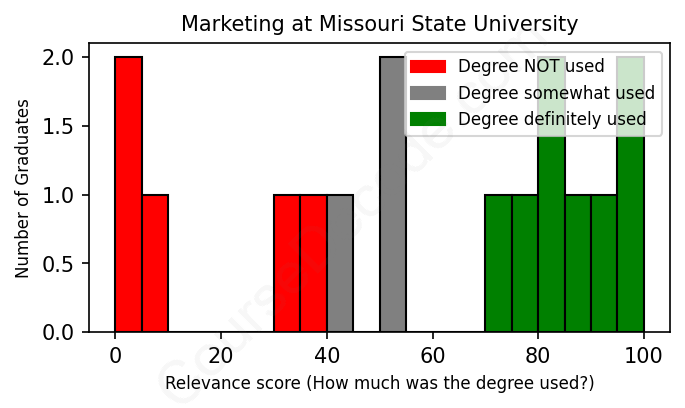
First, some facts. Of the Marketing graduates from Missouri State University we've analyzed , here's how many have used (or NOT used) their degree in their career:

These are estimates based on AI analysis of 16 LinkedIn profiles (see below).
The verdict? Significantly below average. Overall, with an average relevance score of 56%, Marketing graduates from Missouri State University have a much lower likelihood (-11%) of finding work in this field compared to the average graduate across all fields:
And for comparison, here's the chart for all profiles we've looked at across all degrees.
Also, after graduating, only 6% of these graduates have pursued further education other than another Bachelor's degree (such as a Masters degree or other), compared to the average across all profiles of 35%. This suggests a Bachelors degree is enough for most Marketing graduates, and it's normal to look for work straight after graduation.
See the details:
|
Relevance score: 100% We think this person has gone into a career highly relevant to their degree. We think this person has gone into a career highly relevant to their degree.
DEGREE INFOGraduated in 2018 from Missouri State University with a Bachelor's degree in Marketing. No other secondary education since. JOB HISTORY SINCE GRADUATIONFreelance Video Producer Mugan Films LLC Jan 2022 - Apr 2023 Videographer  TLC Properties Dec 2022 - Present ABOUTSkilled in Photography, Adobe Premiere Pro, DaVinci Resolve, Videography, and Problem Solving. Strong operations professional with a Bachelor's degree focused in Marketing/Marketing Management from Missouri State University. |
The top 10 most common jobs done by the graduates we've analyzed (ranked most common to least) are:
From the profiles of graduates from Missouri State University with degrees in Marketing, it seems like most folks ended up in a mix of roles, many of which don’t actually require marketing skills directly. For example, positions like Total Loss Adjuster or Escrow Clerk focus more on industry-specific tasks—like assessing insurance claims or handling real estate transactions—rather than on marketing practices. Even roles in customer service and sales often highlight interpersonal skills but lack a substantial marketing component.
However, there are definitely exceptions. Some graduates found their way into jobs that are more aligned with their marketing background, like SEO Manager or Inbound Marketing Strategist, where applying marketing principles is essential. It’s clear that while a good number of these roles connect back to those marketing skills learned in college, many graduates are still navigating jobs that don’t really tap into their degree's potential, settling for more general positions or ones that lean heavily toward other industries.
Here is a visual representation of the most common words in job titles for Marketing graduates (this is across all Marketing graduates we've analyzed, not just those who went to Missouri State University):

It looks like graduates from Missouri State University with a degree in Marketing have diverse career trajectories, especially right after graduation. Many of the early roles tend to be in sales, customer service, or internships that are quite relevant to marketing. For instance, some graduates ended up as marketing interns or in sales consultant roles shortly after finishing school. This initial exposure typically helps them gain valuable experience and skills that serve as a stepping stone to more specialized marketing positions later on.
Five to ten years down the line, it's clear that a decent number of these graduates find themselves in roles that connect more directly with marketing. There are individuals working as Marketing Coordinators, Digital Marketing Specialists, and Inbound Marketing Strategists. However, there's also a notable portion of alumni whose careers veer off into areas like insurance, real estate, or training, which aren't directly aligned with marketing. This suggests that while many graduates do find pathways relevant to their degree, some others might be exploring different industries and career options that take them away from traditional marketing roles. Overall, it seems like a mixed bag: some are really thriving in marketing-oriented jobs, while others are taking broader paths that may not utilize their marketing training as much as one might expect.
Honestly, a Bachelor’s degree in Marketing can be a pretty balanced mix of challenging and manageable, so I’d say it’s about average in terms of difficulty. At Missouri State University, you’ll likely encounter some tough spots with concepts like consumer behavior and marketing analytics, but there’s also a lot of creativity involved, which can make things more fun. If you’re someone who enjoys working on projects, collaborating in groups, and getting hands-on experience, you might find it easier than you expect! Just keep up with your assignments and stay engaged in class, and you should be just fine.
Most commonly, in the LinkedIn profiles we've looked at, it takes people 4 years to finish a Bachelor degree in Marketing.
Looking through the job histories of these Missouri State University marketing grads, it's clear they've taken a pretty varied path. The older grads seem to have progressed through a mix of sales and management roles, suggesting they might be making decent money now, especially those who landed positions like "Market Development Manager" or "SEO Manager." Meanwhile, some of the more recent grads are still in entry-level or inconsistent roles like internships or part-time gigs, which probably isn’t raking in the big bucks just yet. Overall, while many of the more experienced folks appear to be doing well in their careers, some of the newbies are still climbing the ladder, so it’s a mixed bag when it comes to how much they’re earning.
Here is a visual representation of the most common words seen in the "about" section of LinkedIn profiles who have a Bachelor degree in Marketing (this is across all Marketing graduates we've analyzed, not just those who went to Missouri State University). This may or may not be useful:

Here are all colleges offering a Bachelor degree in Marketing (ordered by the average relevance score of their Marketing graduates, best to worst) where we have analyzed at least 10 of their graduates: